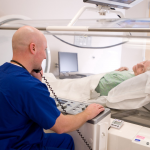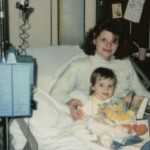By Kimberly Steed, nurse and mother of 2
Every parent has battled a child’s fever. It often happens after the doctors’ offices have closed, in the middle of the night or on the weekend. As parents, we’re often left wondering, “What should I do, or should I do anything at all?
Fever in a healthy child is usually not serious. Fever by itself is usually harmless and just the body’s way of fighting an infection. For healthy, normal-acting children with a rectal temperature lower than 102° F (38.9° C), medication is usually not required. If your child’s fever is making him or her uncomfortable, try giving acetaminophen or ibuprofen but be sure to follow the package directions.
As a mother, I’ve been there. My son had several fevers as an infant and early toddler. He was fine and playing one minute, and the next minute he was fussy, crying & inconsolable. Except for a few throat infections, Glyn has been a healthy child and eventually I started to recognize other symptoms such as a strange smell on his breath, a grimacing when he swallowed, pulling at his ears, not eating/drinking normally, or a red throat.
My husband (who is also a doctor for Mercy) recommends getting medical attention for a fever for the following situations:
- Infants who are less than three months of age and who have a rectal temperature of 100.4° F (38° C) or greater, regardless of how the infant appears (Even the infant that looks well should be evaluated by a medical professional.)
- Children who are three months to three years who have a rectal temperature of 100.4° F (38° C) or greater for more than three days or who appear ill (other symptoms might include being fussy, clingy and/or refusing to drink fluids).
- Children 3 to 36 months who have a rectal temperature of 102° F (38.9° C) or greater.
- Children of any age whose oral, rectal, tympanic membrane, or forehead temperature is 104° F (40° C) or greater or whose axillary temperature is 103° F (39.4° C) or greater.
- Children of any age who have a febrile seizure. Febrile seizures are convulsions that happen when a child (between six months and six years of age) has a temperature greater than 100.4° F (38° C).
- Children of any age who have recurrent fevers for more than seven days, even if the fevers last only a few hours.
- Children of any age who have a fever and have a chronic medical problem such as heart disease, cancer, lupus or sickle cell anemia.
- Children who have a fever as well as a new skin rash.
Besides treating a fever with medications like acetaminophen and ibuprofen, a parent should make sure their child is drinking more fluids because it’ll decrease the risk of dehydration. Also, be sure your child is getting enough rest.
One of the less effective methods of bringing a fever down is “sponging” or baths. Alcohol sponging is NOT a good idea, though, because of the risk of toxicity through skin absorption. If you’re ever in doubt on whether to treat a fever or what a fever might mean, or if your child appears ill and it concerns you, call your doctor for advice.
Last summer while Matt was in Alaska, Glyn developed a fever. He was playing with his trains, and this is how I found him. His temp was 103° F degrees. But after an injection of “vitamin R” (Rocephin) and oral antibiotics, he was ready to welcome daddy home. 🙂
Kimberly is wife to Dr. Matthew Steed, whose number one passion is to care for the pregnancy and birthing needs of women. You may call him at the Mercy clinic at 479-338-5555 to begin your prenatal care and let him help you enjoy your pregnancy journey. His office is located in the Mercy Physician’s Plaza just off Interstate 540 in Rogers.
 NWAMotherlode.com does not provide medical advice, diagnosis or treatment. This content is for informational purposes only and isn’t a substitute for professional medical advice. Always talk to your doctor if you have questions about a medical condition. Don’t delay getting professional medical advice because of something you read online. This website doesn’t necessarily recommend or endorse any specific tests, doctors, products, procedures or opinions discussed on the site.
NWAMotherlode.com does not provide medical advice, diagnosis or treatment. This content is for informational purposes only and isn’t a substitute for professional medical advice. Always talk to your doctor if you have questions about a medical condition. Don’t delay getting professional medical advice because of something you read online. This website doesn’t necessarily recommend or endorse any specific tests, doctors, products, procedures or opinions discussed on the site.





